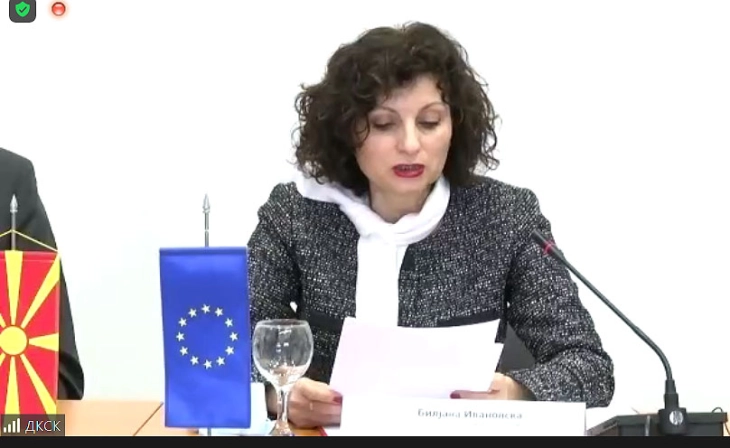SCPC commitments not producing expected result, citizens to increase corruption reporting

Skopje, 9 December 2021 (MIA) – Corruption, the biggest evil of society, undermines democracy and human rights, penetrating in all fields, especially in places where it comes across individuals with an accentuated feeling of personal interest, greed, vanity, wish for power and influence, having no integrity and ethics. Therefore, the major commitment of the State Commission for Prevention of Corruption (SCPC) is to build strong institutions by strengthening the officials’ integrity, whose legal, independent, impartial, ethically responsible and transparent way of carrying out job tasks would prevent corruption, while maintaining their own image and the reputation of their institution, SCPC President Bljana Ivanovska told conference “Choose the Right Direction! Choose Integrity!” on occasion of International Anti-Corruption Day-December 9.
“Our commitments do not produce the expected result, primarily due to the fact that corruption risks we detected when drafting the National Strategy more than two years ago are still high. They include strong political influence, impunity, lack of transparency and abuse of discretionary powers. Because of these risks, the SCPC recommendations to other institutions within the system are not fully considered,” said Ivanovska.
According to her, there is still partisan bargaining for high-level managerial positions, which ought to be filled through public calls, fair contest and merit system. She added that the public bears witness of managers’ dismissals for political revenge, employments using well-known schemes of nepotism, clientelism and cronyism.
“SCPC has said on many occasions this way of operating by political elites undermines the integrity of institutions and erodes people’s trust, whereas the export of educated human capital has continually been on the rise,” said Ivanovska.
She noted that the situation’s overcoming required putting policies, systems and measures in place, so that people talk and say ‘no’ to corruption.
Ivanovska said citizens’ awareness is increasing, but expects their readiness to report unlawful activities and corruption to also rise.
Group of States against Corruption (GRECO) President Marin Mrcela said in an online address that fight against corruption is on the top of the national political agendas across Europe, adding that progress in preventing and combating corruption depended on the political will and people in the right positions.
“Successful and credible approach to corruption requires strategic, comprehensive and coordinated measures, as well as high level of transparency of the political, administrative and economic life. Regarding North Macedonia, the authorities should speed up the full implementation of GRECO recommendations for corruption prevention,” said Mrcela.
Parliament Vice-Speaker Goran Misovski said the observance was a reminder for all active stakeholders in the country to be vigilant and alarm any slightest emergence of this phenomenon, in order to prevent it from spreading to larger segments of society.
“Let’s be committed in this fight, in which every individual matters, whose actions or decisions, as small and irrelevant as they might seem, launch the vicious circle that is difficult to leave later,” said Misovski.
Julian Vassallo, Deputy Head of the EU Delegation to Skopje, said the main ingredient for a successful fight against corruption is integrity, highlighting that it undermines democracy and rule of law – the foundations of European societies – deepens inequality and weakens social cohesion.
“Corruption creates a feeling of despair, cynicism and lack of belief in the possibility of a change for the better. Corruption is a global challenge, including the EU, and we continue to fight it,” he added.
Clemens Koja, Head of the OSCE Mission to Skopje, said they strongly support the implementation of key reforms in the country, including the ones to enhance the national anti-corruption agenda.
“Corruption contributes to increased discrimination against women, gender inequality and more poverty. Our research has shown that women are more exposed to the specific form of corruption than men, especially in the part of sexual extortion, namely asking sexual services in exchange for certain other services,” said Ambassador Koja.
Today’s conference is part of EU-funded project “Promoting Transparency and Accountability in Public Administration”.







